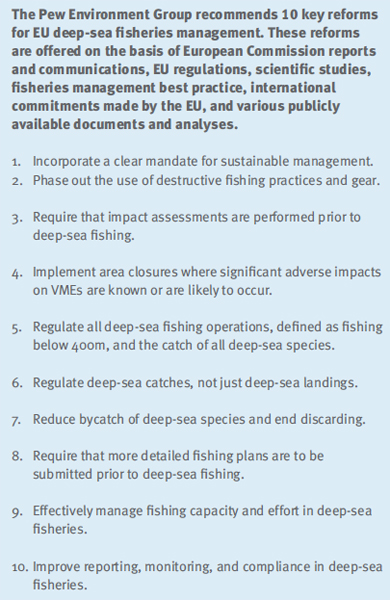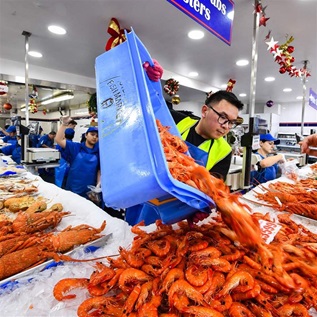Out of the Abyss: Transforming EU Rules to Protect the Deep Sea
As currently practised, deep-sea fishing has serious and widespread environmental consequences for deep-sea fishing countries, the international community, and ocean ecosystems.
Studies reveal that deep-sea fishing fleets around the world are causing significant harm to the ocean ecosystem by damaging vulnerable marine ecosystems (VMEs) both within their Exclusive Economic Zones (EEZs) and on the high seas. Such damage occurs through bottom contact with fragile habitats and the overfishing of highly vulnerable deep-sea species, including orange roughy (Hoplostethus altanticus), deep-sea sharks (e.g. Centrophorus spp.), and grenadiers (Coryphaenoides spp.). Many deep-sea species are now believed to be depleted regionally, if not globally.

The European Union's (EU) deep-sea fishing fleet is one of the largest in the world. In the northeast Atlantic – home to some of the most heavily exploited deep-sea fish stocks – the EU is responsible for 75 percent of the total regional catch of deep-sea species. The EU is also a major player in high seas bottom fishing – an activity that frequently targets deep-sea species. The EU has an estimated 103 vessels conducting high seas bottom fishing, which is approximately one-third of the high seas bottom fishing fleet globally. Given its size, the EU is uniquely poised to significantly improve the sustainability of deep-sea fishing and reduce negative impacts on VMEs.
Importantly, deep-sea fisheries are of little economic importance. Globally, deep-sea fisheries account for just 2 to 4 percent of world landings. And in the EU, deep-sea fisheries account for just 1.2 percent of the EU's northeast Atlantic catch and 1.3 percent of the value of EU fishery product landings.
This policy paper summarises the current problems in the regulation of deep-sea fisheries in the northeast Atlantic by the EU, including weak catch and effort limits, lack of knowledge of the status of deep-sea fish stocks and the impact of fishing; incomplete deep-sea species coverage; deficient monitoring and control measures; significant data and reporting gaps; and a lack of sufficient measures to ensure sustainability and protect vulnerable deep-sea ecosystems such as cold-water coral reefs from the harmful impacts of bottom fisheries. Various assessments have found that the EU's deep-sea fisheries management regime for the northeast Atlantic is inadequate, poorly enforced, and inconsistent with EU and international principles, agreements and legal obligations for the sustainable management of fisheries. As a result, leading scientific authorities have concluded that the EU's fisheries for deep-sea species in the northeast Atlantic are ‘outside safe biological limits' and that deep-sea fishing should be significantly reduced or ended entirely.











